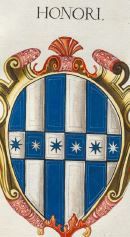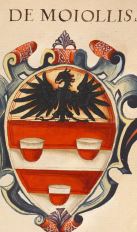Counterchanged
WARNING: Do not cite this page as a reference. This page is on this wikispace only to make the content "searchable" and easier to find. If you find the information you seek here, go to the original sources to verify the information and use them for your documentation.
A note on counterchanging and conflict: Note that "Per X and Y, a SINGLE charge counterchanged" has two DCs from its opposite (one for the field, one for changing the tincture of the charge). But in cases with multiple charges _not crossing_ a line of division, there is only one DC (for the field), as the charges have a forced changed of arrangement, not a tincture swap. For example, there are still 2 yellow and 2 black cats, just in different places on the field - forced by the change of the field tinctures.
(SENA Armory Conflict - 3. Change of Tincture Within a Charge Group: a. Tinctures: ...There is a distinct change (DC) for swapping or rotating the tinctures of a charge group evenly divided into two, three, or four parts. There is not a distinct change for reversing the tinctures of a charge group divided into more than four parts.)
Illustrations:[edit | edit source]
Period:[edit | edit source]
French[edit | edit source]
| File:Traite f168 1475 Gyronny.jpg |
| Armorial et Traité d'Héraldique, 1475, f168 |
Italian[edit | edit source]
| BSB 274 | 
|

|
| BSB 274, Insignia Veneta, 1550-55, f120r, legal? | BSB 276, Insignia Nobilium Veronensium, Vicentinorum, 1550-55, f30, Honori | BSB 270, Insignia Urbium Italiae Septentrionalis, 1550-1555, f285, De Moiollis |
An Ordinary of Siebmacher's Wappenbuch[edit | edit source]
Modern:[edit | edit source]
Pictorial Dictionary, 3rd edition:[edit | edit source]

|

|

|
| Item | Item | Item |
Vector Graphics:[edit | edit source]
- Viking Answer Lady - http://www.vikinganswerlady.com/Stars/Heraldry_SVG_Images/index.htm
Pennsic Traceable Art Project[edit | edit source]
Book of Traceable Heraldic Art[edit | edit source]
A Heraldic Primer: Counterchanging -[edit | edit source]
http://heraldry.sca.org/primer/counterchanging.html (defunct old version)
Counterchanging is a common practice wherein the field is divided between a metal and a color. Upon that field is a charge or group of charges whose tinctures are of the opposite tincture. For instance, if one has Per pale sable and argent, two roundels counterchanged, the roundel on the sable part of the field is argent and vice versa as such...
Counterchanging can also be applied to single charges and groups of charges.
| * Per pale sable and argent, a roundel counterchanged | 
|
| * Per pale sable and argent, three roundels counterchanged | 
|
Any field division which is in two tinctures can have counterchanged charges placed on the field.

| |
| Quarterly sable and argent, four roundels counterchanged// | 
|
| Per chevron sable and argent, three roundels counterchanged// | 
|
| Gyronny sable and argent, eight roundels counterchanged// | 
|
| Per bend sable and argent, two roundels in bend sinister counterchanged. |
SENA Armory Part 3, Style - Designs that Are Not Allowed:[edit | edit source]
SENA A3F4. Excessive Counterchanging: While counterchanging was common in period armory, it was used mainly with two or four part divisions of the field. Counterchanging of charges over more complex field divisions (barry, gyronny, etc.) is allowed with a semy or similar group of charges; in that design each charge should be drawn so that it is entirely on a single portion of the field. The counterchanging of a single charge over a field division with more than four sections must be attested to be allowed. Central ordinaries may be counterchanged over other simple ordinaries, as there are a few examples of patterns like Argent, a pile sable, overall a chevron counterchanged in late period England. Any other counterchanging of charges over other charges must similarly be attested to be registered. http://heraldry.sca.org/sena.html#A3
Precedents:[edit | edit source]
Precedents of the SCA College of Arms - http://heraldry.sca.org/laurel/precedents.html
Morsulus Heralds Website - http://www.morsulus.org/ (to search the LoARs and Precedents)
Use the above links to be sure any precedents listed below haven't been superseded by newer precedents.
Definition:[edit | edit source]
(includes defaults, proper tinctures, blazoning)
Registerability:[edit | edit source]
(Restricted, Reserved, SFPP, OOP)
January 2008 - bordure over chief, bordure over pile:[edit | edit source]
"The most common depiction of a chief and a bordure has the chief overlying the bordure__; however, precedent indicates that there are __some examples of bordures overlying chiefs (v. Ambrosius MacDaibhidh, December 1995). Prior precedent states: Please note that the design of counterchanging a bordure over a pile is considered "a weirdness" in the SCA - a single step from period practice (per the LoAR of July 2001). One such step in armory is acceptable, but more than one such step is considered too far from period practice and reason for return. [Clef of Cividale, 03/03, R-Calontir] Similarly, barring period evidence of such counterchanging, counterchanging a bordure over a chief is also a step from period practice." [2008 LoAR]
August 2001 - multiply-divided fields:[edit | edit source]
[Per pale and per saltire gules and argent, on a roundel counterchanged a spider inverted and a bordure sable] No evidence was presented, and none was found, for counterchanging a central roundel over this field, or the similar gyronny field, in period armory. Such a design will not be acceptable without documentation: "In general, we would like to see documentation for any charge counterchanged over a multiply divided field, such as barry or gyronny" [2001 LoAR]
December 1998 - only ordinaries over ordinaries:[edit | edit source]
"The only time we permit a charge to be counterchanged over another is when they are both ordinaries." [1998 LoAR]
June 1994 - wreath over ordinaries:[edit | edit source]
"By current precedent, a laurel wreath is considered too complex a charge to be counterchanged over an ordinary."[1994 LoAR]
May 1993 - complex charges over ordinaries:[edit | edit source]
"The counterchanging of the complex charges over the ordinary is visually confusing, and disallowed per Rule VIII.3. This interpretation has been in force since April 90; it was most recently reaffirmed in the case of the Shire of Blackmoor Keep, LoAR of Oct 92."[1993 LoAR]
May 1992 - maunch over ordinaries:[edit | edit source]
"The opinion of the commenting heralds was unanimous that a maunch is too complex a charge to be counterchanged over an ordinary."[1992 LoAR]
Conflict:[edit | edit source]
Identifiability:[edit | edit source]
Collected Precedents:[edit | edit source]
- 2nd Tenure of Elisabeth de Rossignol (April 2011 - August 2011) - Collected Armory Precedents
- 1st Tenure of Elisabeth de Rossignol (May 2005 - July 2008) - Collected Armory Precedents
- 2nd Tenure of François la Flamme (October 2004 - May 2005) - Collected Armory Precedents
- The Tenure of Shauna of Carrick Point (May 2004 - August 2004) - Collected Armory Precedents
- 1st Tenure of François la Flamme (August 2001 - April 2004) - Collected Armory Precedents
- The Tenure of Elsbeth Anne Roth (June 1999 - July 2001) - Collected Armory Precedents
- The Tenure of Jaelle of Armida (June 1996 - June 1999) - Single HTML Document
- 2nd Tenure of Da'ud ibn Auda (November 1993 - June 1996) -
- The Tenure of Bruce Draconarius of Mistholme (June 1992 - October 1993) - Collected precedents
- 1st Tenure of Da'ud ibn Auda (June 1990 - June 1992) -
- The Tenure of Alisoun MacCoul of Elphane (September 1986 - June 1990) - Collected Precedents
- The Tenure of Baldwin of Erebor (August 1984 - August 1986) - Single HTML Document
- The Tenure of Wilhelm von Schlüssel (August 1979 - August 1984) - Collected Precedents
- The Tenure of Karina of the Far West (December 1975 - June 1979) - Collected Precedents
- The Early Days (June 1971 - June 1975) - Collected Precedents
